Coconut Sugar Market Research, 2031
The global Coconut Sugar Market Size was valued at $243.4 million in 2021 and is projected to reach $408.7 million by 2031, growing at a CAGR of 5.5% from 2022 to 2031.
Coconut sugar is made from the coconut palm's flower bud stem sap. Major producers, the Philippines, Indonesia, and Thailand have contributed about 80% of the world's production during the past few decades. This is because their cultivation circumstances are favorable.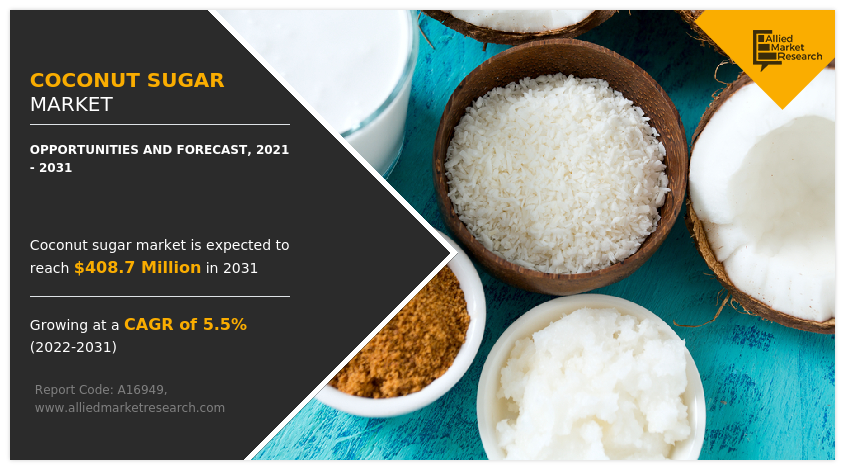
Market Dynamics
Farmers "tap" the coconut tree's flower bud stem by making a cut on its spadix to start the process of creating coconut sugar. The sap inside then flows into below-ground containers where it is collected. The gathered sap is then put into big woks and heated to a moderate temperature to evaporate any extra water, thickening it into a syrup.
75g of the 100g of carbohydrates in 100g of coconut sugar are sugars. 100g has 125 mg of sodium and 625 mg of potassium in terms of trace elements. Coconut sugar contains more iron, zinc, and calcium than granulated sugar and high-fructose corn syrup, according to research from the Food and Nutrition Research Institute of the Philippine government.
In the food business, coconut sugar is frequently used as a sweetener. Most of its applications are in beverages, confectionery, and pastry goods. In contrast to other sweeteners, coconut sugar contains calories. However, coconut sugar has many uses in the food business because it has fewer calories than regular sugar. In addition, coconut sugar is utilized in the cosmetics sector, typically in skin.
The market for food is seeing an increase in demand for coconut sugar. The demand for natural and high-quality food products is rising all around the globe, which presents a chance for producers of coconut sugar in developing nations. Coconut sugar is a good option for food manufacturers because of its distinctive qualities and growing availability.
The official World Health Organization recommendation for sugar consumption is no more than 10% of total calories. Only roughly 23 nations achieve this suggested level. The European soft drink industry declared a commitment to further cut added sugars in soft drinks by 10% from 2019 to 25 across the EU-27 and the UK in June 2021. This promise excludes coconut sugar. However, it does demonstrate the trend in Europe toward reducing sugar consumption as consumer knowledge rises. Coconut sugar has a lower glycemic index than regular sugar, making it healthier (GI). Coconut sugar consumption lowers the risk of diabetes and other sugar-related illnesses. In addition, according to International Diabetes Federation, diabetes is a chronic disease that occurs when the pancreas is no longer able to make insulin, or when the body cannot make good use of the insulin it produces. Moreover, the growth in the number of diabetes patients globally is one of the major concerns and in 2020 there were approximately 463 million adults which is every 1 in 11 adults (20-79 years) who are suffering from diabetes and the number of patients is expected to increase to 700 million till 2045. Moreover, more than half of the adults diagnosed with diabetes are from countries with low and middle income, and every 1 in 5 people who is in or above the age of 65 years old is suffering from diabetes. Therefore, owing to the rise in the number of patients with diabetes, the demand for sugar alternatives is rising in the market.
In addition, another factor fueling the demand for coconut sugar is the growing trend toward veganism. Another vegan substitute for cane sugar is coconut sugar. The white hue of regular sugar is occasionally achieved through the processing of animal bone char. Coconut sugar is a raw, vegan substitute for normal sugar. The animal rights group People for the Ethical Treatment of Animals (PETA) recommends coconut sugar as a vegan substitute for conventional sugar on its website.
The demand for coconut sugar is anticipated to increase further as the vegan population grows. Since bone char is used in the production of conventional sugar, it is not thought to be suitable for vegans. Coconut sugar is regarded as a vegan substitute. In Europe, there are thought to be 75 million vegans and vegetarians.
However, the coconut sugar market faces stiff challenges from the availability of alternative products including but not limited to maple syrup, corn syrup, chocolate syrup, honey, molasses, agave nectar, date syrup to name a few, which are highly popular among consumers. Maple syrup is one of the most common and popular syrups or natural sugar substitutes preferred by the consumers owing to its natural sweetness obtained from the maple tree. In addition, there is an increase in the consumption of this syrup. Also, chocolate syrup and honey are the most common sweeteners which are used and available in different retail formats. Therefore, the availability of a large number of substitutes for coconut syrup impedes the expansion of the coconut sugar market.
Segmental Overview
The coconut sugar market is segmented into form, end user, application, sales channel, and region. On the basis of form, the market is categorized into organic coconut sugar and conventional coconut sugar. On the basis of end user, the market is bifurcated into commercial and residential. On the basis of application, the coconut sugar market size is categorized into food & beverage, cosmetic and personal care products. Based on sales channel, it is fragmented into supermarket/hypermarket, specialty stores, online sales channel and business-to-business. Region-wise, it is analyzed across North America (the U.S., Canada, and Mexico), Europe (UK, Germany, France, Italy, Spain, Russia, and rest of Europe), Asia-Pacific (China, India, Japan, Australia, South Korea Australia, Singapore, New Zealand, and rest of Asia-Pacific), and LAMEA (Brazil, Argentina, Saudi Arabia, South Africa, UAE, and rest of LAMEA).
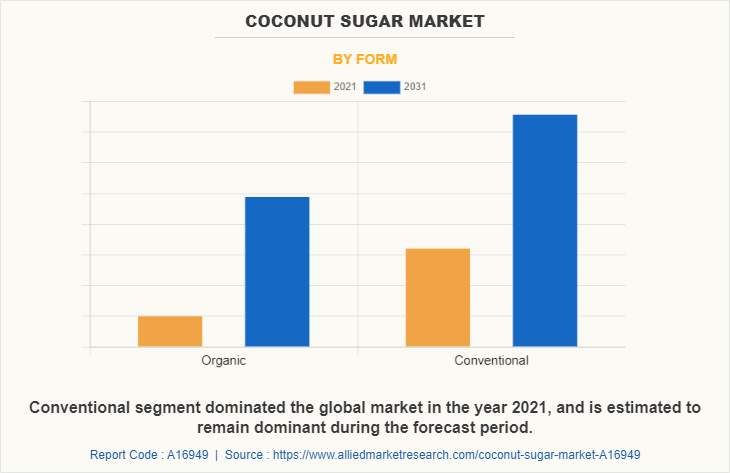
By form, the global coconut sugar market dominated the global market in 2021, and is projected to reach $408.7 million by 2031, registering a CAGR of 5.5% from 2022 to 2031. Conventional coconut sugar is dominant around the globe as the production and availability is higher for this segment. However, the organic segment is expected to be the fastest-growing segment during the Coconut Sugar Market Forecast period. This is attributed to the rising demand for organic natural sweeteners in the market as more and more customers are shifting toward organic products.
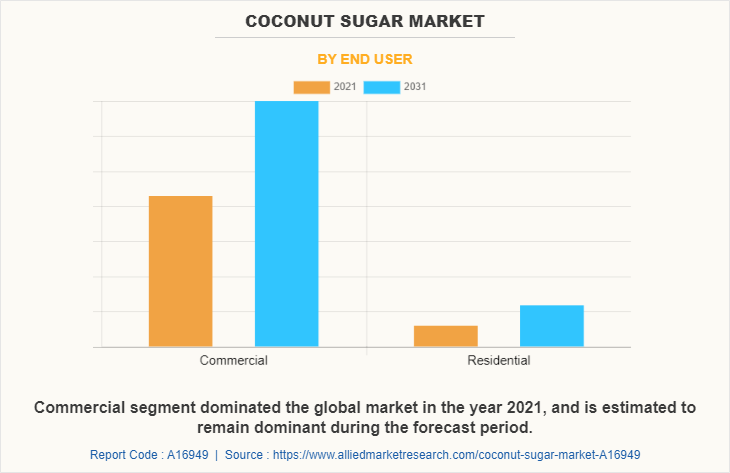
By end user, the commercial segment dominated the Coconut Sugar industry in 2021, and is estimated to reach $349.7 million by 2031, with a CAGR of 5.2%. This is attributed to the expansion of the bakery and food service industry. From baked products to sauces and syrups to coffee, coconut sugar can be used in recipes as a sugar alternative. Furthermore, coconut sugar has a mild caramel-like flavor, which can make sweets taste different when compared to utilizing other sugars. Most of the commercial use of coconut sugar is in the field of food & beverages, confectionery.
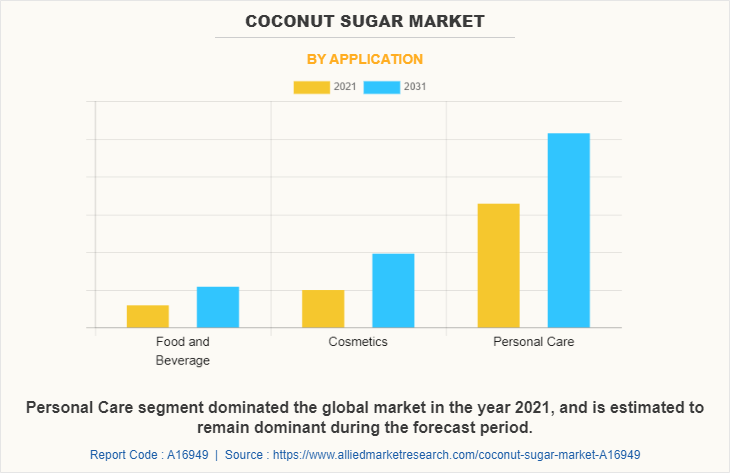
By application, the personal care segment dominated the global coconut sugar market share in the year 2021 and is estimated to reach $256.9 million by 2031, with a CAGR of 4.8%. A unique property of coconut sugar is its crystalline nature which is widely used in scrubs and get easily dissolves in numerous personal care products. Coconut sugar is majorly used in body washes, shampoos, and sunscreens. Furthermore, coconut sugar has a nice sensation on application to the skin which is leading to a rising in the demand for personal care products. In addition, coconut sugar is used in the formulation of lotions, and creams owing to the presence of iron, zinc, calcium, and potassium. However, the cosmetic segment is expected to be the fastest-growing segment during the forecast period.
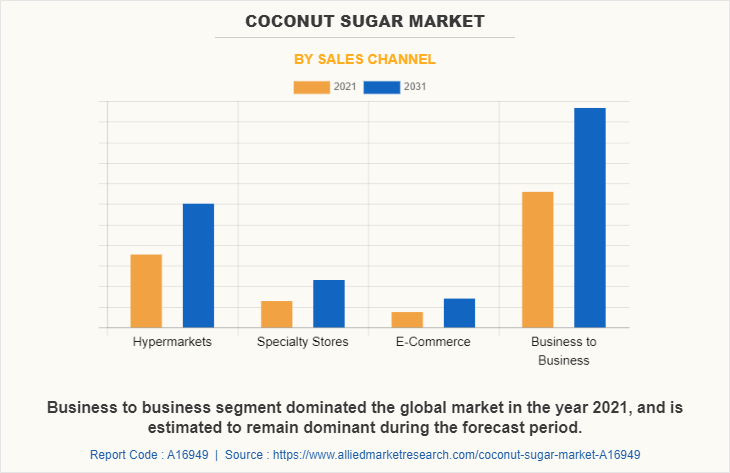
By distribution channel, the business-to-business segment held the maximum Coconut Sugar Market Share in 2021, and is estimated to reach $213.8 million by 2031, with a CAGR of 5.2%. This is attributed to the consumption in the commercial segment is higher which is making business-to-business the dominant distribution channel in the market. However, E-commerce is expected to be the fastest-growing segment during the forecast period.
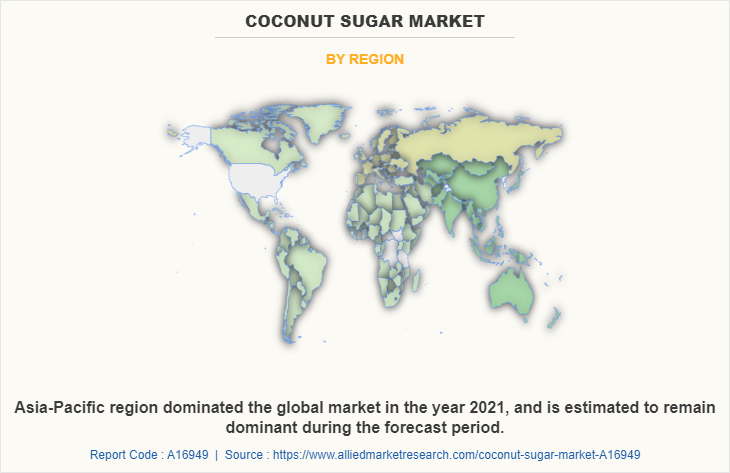
Region-wise, Asia-Pacific dominated the coconut sugar market in 2021 and is estimated to reach $250.9 million by 2031, with a CAGR of 5.6%. Europe is estimated to reach $76.4 million by 2031, at a significant CAGR of 5.0%. Asia-Pacific and Europe collectively accounted for around 80.5% share in 2021. Demand is being fueled by coconut sugar's nutritional advantages. Since it is considered a healthier alternative to sugar, European food and beverage companies are using it in their product formulations.
Competition Analysis
The players operating in the global coconut sugar market have adopted various developmental strategies including but not limited to product launch, geographical expansion and acquisitions to increase their market share, gain profitability, and remain competitive in the market. The key players operating in the coconut sugar market include The Coconut Company (UK) Ltd, The Divine Foods, Franklin Baker, Coco Sugar Indonesia, Big Tree Farm, NOW Foods, Nutiva Inc, Madhava Ltd., AGRIM PTE LTD, Tradin Organic Agriculture B.V., Koperasi Nirasatria, Singabera, Treelife, Groovy Food Company Ltd, Connecticut Coconut Company, Betterbody Foods, and Wholesome Sweetener Inc.
Key Benefits For Stakeholders
- This report provides a quantitative analysis of the market segments, current trends, estimations, and dynamics of the coconut sugar market analysis from 2021 to 2031 to identify the prevailing coconut sugar market opportunities.
- The market research is offered along with information related to key drivers, restraints, and opportunities.
- Porter's five forces analysis highlights the potency of buyers and suppliers to enable stakeholders make profit-oriented business decisions and strengthen their supplier-buyer network.
- In-depth analysis of the coconut sugar market segmentation assists to determine the prevailing market opportunities.
- Major countries in each region are mapped according to their revenue contribution to the global market.
- Market player positioning facilitates benchmarking and provides a clear understanding of the present position of the market players.
- The report includes the analysis of the regional as well as global coconut sugar market trends, key players, market segments, application areas, and Coconut Sugar Market Growth strategies.
Coconut Sugar Market Report Highlights
| Aspects | Details |
| Market Size By 2031 | USD 408.7 million |
| Growth Rate | CAGR of 5.5% |
| Forecast period | 2021 - 2031 |
| Report Pages | 285 |
| By Application |
|
| By Sales Channel |
|
| By Form |
|
| By End User |
|
| By Region |
|
| Key Market Players | PT coco sugar Indonesia, Brio Feed, Tree Life, Cocosugar, The Coconut Company Ltd, Vita Coco, Big Tree Farms, Amala Earth, Marico Ltd, Celebs Coconut Corporation, betterbody foods & nutrition, Madav Ltd |
Analyst Review
The consumption of coconut sugar is on the rise owing to increase in demand from the commercial sector especially from HoReca industry (Hotel, Restaurant, and Café). Bakeries and restaurants are the major consumers of the plant-based sugar, which is utilized for basking pastries & biscuits as an artificial sweetener replacement, like the saccharin and aspartame. In addition, this sugar is also utilized as an important ingredient for a large variety of dishes included but not limited to cake, pancake, waffles, yogurt, and oats to name few. The coconut sugar is used in bakeries and restaurants and as a sugar substitute for beverages like coffee and tea. Increase in popularity of coconut sugar and rise in adoption from commercial sector to further drive market expansion of coconut sugar market in the coming years.
Moreover, coconut sugar is gradually becoming popular owing to its taste and high nutritional value. As a result, consumers are incorporating coconut sugar in their regular consumer products, which propels the demand for coconut sugar in the residential segment.
Another factor which influences the demand for coconut sugar is rise in demand for organic natural sweeteners. There is an increase in the demand for organic products as consumers are becoming health conscious. Consequently, the demand for organic coconut sugar has witnessed significant increase in the past four years especially in the countries of Asia-Pacific and Europe including but not limited to China, India, and Germany. The demand for organic sweeteners is expected to gain high traction across the world with the growing consumer awareness regarding organic variant of the product and downward pressure on the price point.
The global coconut sugar market was valued at $243.4 million in 2021, and is projected to reach $408.7 million by 2031, registering a CAGR of 5.5%.
From 2022-2031 would be forecast period in the market report
$243.4 million is the market value of coconut sugar market in 2021.
2021 is base year calculated in the coconut sugar market report
The Coconut Company (UK) Ltd, The Divine Foods, Franklin Baker, Coco Sugar Indonesia, Big Tree Farm, NOW Foods, Nutiva Inc, Madhava Ltd.are the top companies hold the market share in coconut sugar market.
Loading Table Of Content...



